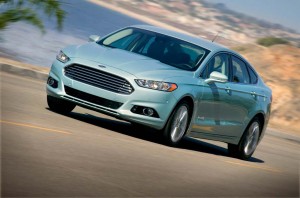They’re still testing the ball before the big celebration in Times Square tomorrow night, and the industry won’t officially announce final 2013 sales numbers until later in the week – but no matter, Ford Motor Co. is already declaring victory, pronouncing its flagship Ford marque North America’s best-selling brand for the fourth year in a row.
The maker notes it has a significant lead over second-place Toyota as it regains strength in parts of the country long dominated by imports. But at least one of the Detroit maker’s Japanese competitors has been downplaying the sales numbers, claiming victory of its own.
“The great news is that we are not overly reliant on any one segment – we’re seeing double-digit sales growth in cars, trucks and utilities,” said John Felice, vice president, U.S. marketing, sales and service, in a year-end statement. “The Ford brand has had more retail share growth than any other brand in the country, with our most significant gains coming from import-dominated coastal markets. With 16 launches next year, we’re looking to keep our sales momentum going.”
There’s no question Ford had a good 2013 – albeit with a few headaches that could cause it problems next year.
The second-largest of the Detroit makers saw the so-called Blue Oval brand deliver a 15% increase in retail sales this year, with its market share growing in a number of key segments, from cars to trucks and even in the emerging battery-based vehicle market.
All told, the Ford brand expects to finish the year with total sales of more than 2.4 million vehicles. While rival Toyota won’t report its own numbers until January 2, Ford notes it had a 396,041 vehicle lead through the first 11 months of the year. It beat Toyota by 329,677 for all of 2012.
Both the Ford Fiesta and Fusion models set all-time records in 2013, the maker says, and the big F-150 pickup had its best year since the U.S. automotive market plunged into recession – reflecting the overall revival of the truck market. The F-Series is expected to remain the nation’s best-selling vehicle for the 32nd consecutive year – and best-selling truck for the 37th year.
(New aluminum F-150 likely to be the star of next month’s Detroit Auto Show. Click Herefor the story.)
Ford also nearly tripled its hybrid vehicle sales to more than 80,000 – though it remains a distant second compared to Toyota which dominates the segment with its Prius and other gas-electric models.
The Ford C-Max hybrid was, in fact, the source of some of Ford’s biggest headaches in 2013, the Detroit maker having to restate the people-mover’s mileage after it became clear it wasn’t living up to its EPA-approved rating. Several other Ford models, including the Fusion Hybrid, have also been the source of complaints about lower-than-expected fuel economy.
(Michigan approves on-road testing of autonomous vehicles. Click Here for the story.)
But there have been other nagging problems for Ford this past year, notably its slide in various quality-based surveys, such as the closely followed J.D. Power and Associates Initial Quality Survey. Problems with Ford’s Sync and MyFordTouch infotainment technology have been major source of those headaches, but there have been other issues, including complaints about the dual-clutch transmission used in such models as the Fiesta.
Ford is also ending 2013 trimming back production on some key models, including Fusion, in order to better balance inventory with demand.
(Hyundai unexpectedly ousts U.S. CEO John Krafcik. Click Here for more.)
Nonetheless, it has good reason to celebrate the soon-to-end year, particularly as it shows new momentum in import-oriented markets such as California. But Ford still has its challenges in the nation’s largest automotive market where it holds a modest 11.2% share compared to Honda’s 13.5% as of the end of November.
In fact, Honda isn’t ready to cede victory to Ford, its top U.S. executive John Mendel declaring, “A sale isn’t always a sale.” Honda contends that for the first 11 months of 2013 it actually held retail sales leadership in the U.S. market and is on track to end the year in first place.
Does that matter? Mendel is quick to argue that retail sales are generally much more profitable than the daily rental fleet business Detroit makers have often relied on to prop up demand and keep factories humming. But Ford is equally quick to counter that not all fleet sales are the same. It earns big money from many corporate fleet sales, especially when it comes to purchases of high-profit products like the F-Series.
But Honda isn’t the only one likely to try to challenge Ford’s claim. The Toyota Camry is expected to once again emerge as the best-selling passenger car after a tight race with the Honda Accord. .
Meanwhile, Mercedes-Benz, which held a slight edge going into December, is also locked in a fierce battle with BMW for leadership in luxury vehicle sales. Toyota’s Lexus brand, the former champion, appears to be a distant third.
Nonetheless, while its competitors are likely to continue arguing over the fine points, Ford is content to claim that for 2013, it came out on top.
(Joe Szczesny contributed to this report.)

